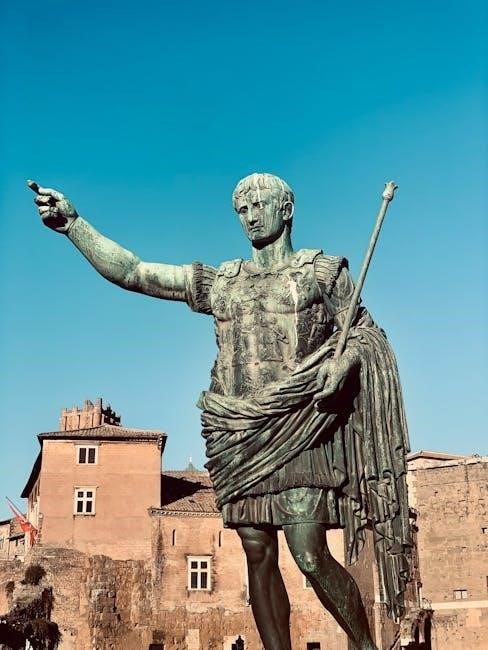Julius Caesar Notes PDF provides a comprehensive guide to Shakespeare’s tragedy‚ offering summaries‚ analysis‚ and historical context․ Ideal for students‚ it enhances understanding of the play’s themes and significance․
1․1 Overview of the Play
Julius Caesar is a tragedy by William Shakespeare‚ set in Rome during 44 BC․ It explores Caesar’s rise to power‚ his assassination by Brutus and Cassius‚ and the ensuing political turmoil․ The play delves into themes of ambition‚ loyalty‚ and fate‚ offering insights into human nature and political intrigue․ Its historical backdrop and complex characters make it a timeless classic for study and analysis․
1․2 Importance of Study Notes for Students
Study notes on Julius Caesar are essential for students to grasp the play’s complex themes‚ characters‚ and historical context․ They provide summaries‚ analysis‚ and key insights‚ helping students understand Shakespeare’s language and the play’s significance․ These resources also aid in exam preparation‚ essay writing‚ and class discussions‚ ensuring a deeper comprehension of the tragedy and its enduring relevance in literature and history․

Plot Summary of Julius Caesar
Julius Caesar’s rise to power sparks fear among senators‚ leading to his assassination․ The play explores themes of ambition‚ betrayal‚ and fate․
2․1 Setting of the Play
The play is set in Rome during February 44 B․C․‚ with key scenes in the Roman Senate‚ the Tiber River‚ and the Capitol․ The story later shifts to Sardis and Philippi‚ showcasing the political and cultural backdrop of ancient Rome․ The setting highlights the city’s grandeur‚ political turmoil‚ and the clash of power and tradition․
2․2 Key Events and Turning Points
The soothsayer warns Caesar of the Ides of March‚ foreshadowing his fate․ Cassius and Brutus conspire against Caesar‚ leading to his assassination in the Senate․ Antony’s powerful eulogy sways public opinion‚ turning the tide against the conspirators․ The Battle of Philippi marks the downfall of Brutus and Cassius‚ solidifying Antony and Octavius’s rise to power‚ reshaping Rome’s future․

Key Characters in Julius Caesar
Julius Caesar‚ Brutus‚ Cassius‚ Mark Antony‚ and Octavius are central figures‚ each playing pivotal roles in shaping the play’s political and emotional dynamics․
3․1 Julius Caesar: His Role and Significance
Julius Caesar is portrayed as a powerful‚ ambitious leader whose rise threatens Rome’s political balance․ His tragic downfall highlights the consequences of unchecked power and the complexities of human ambition‚ serving as a cautionary tale about leadership and fate․
3․2 Mark Antony: A Loyal Friend and Politician
Mark Antony is Caesar’s loyal ally and skilled politician‚ whose emotional appeal to the crowd after Caesar’s death showcases his mastery of rhetoric․ His loyalty and ambition drive the plot‚ making him a central figure in the struggle for power following Caesar’s assassination․
3․3 Brutus and Cassius: The Conspirators
Brutus and Cassius‚ driven by fear of Caesar’s rising power‚ lead the conspiracy against him․ Brutus‚ motivated by a misguided sense of honor and duty to Rome‚ believes in eliminating Caesar for the Republic’s sake; Cassius‚ more cynical and manipulative‚ instigates the plot‚ exploiting Brutus’s idealism to further their shared goal of restoring senatorial control․

Themes in Julius Caesar
The play explores themes of power‚ ambition‚ loyalty‚ betrayal‚ fate‚ and honor‚ highlighting the moral and political struggles of ancient Rome’s leaders and citizens․
4․1 Power and Ambition
The theme of power and ambition is central to Julius Caesar‚ as Caesar’s rise to dominance sparks fear among Roman senators․ His ambition for kingship threatens the republic‚ leading conspirators to act․ Brutus and Cassius‚ driven by their own ambitions‚ justify assassination as a means to preserve Rome’s political balance․ The play explores how unchecked power and ambition lead to destruction and chaos‚ shaping the fate of Rome․
4․2 Loyalty and Betrayal
Loyalty and betrayal are pivotal themes in Julius Caesar․ Brutus’s internal conflict between loyalty to Caesar and loyalty to Rome highlights the moral ambiguity of betrayal․ Cassius manipulates Brutus‚ exploiting his sense of duty to the republic‚ leading to Caesar’s assassination․ The play explores how betrayal‚ justified as loyalty to a greater cause‚ ultimately leads to tragic consequences and political upheaval in Rome․
4․3 Fate vs․ Free Will
The interplay between fate and free will in Julius Caesar is a central theme․ The Soothsayer’s warning to Caesar‚ “Beware the Ides of March‚” symbolizes fate’s inevitability․ Caesar’s decision to ignore it reflects his belief in free will‚ yet his assassination unfolds as fate dictates․ Brutus and Cassius‚ driven by their own free will‚ conspire against Caesar‚ believing their actions align with destiny․ This tension underscores the tragedy‚ as characters navigate between predetermined outcomes and personal choices‚ ultimately shaped by their own decisions and external forces․

Historical Context of Julius Caesar
The play is set in 44 BC Rome‚ a republic transitioning toward empire․ The political structure‚ dominated by the Senate‚ is central to the story․ Caesar’s rise‚ civil war victories‚ and dictatorship set the stage for his assassination‚ reflecting Rome’s turbulent shift from republic to imperial rule․
5․1 Ancient Rome and Its Political Structure
Ancient Rome in 44 BC was a republic transitioning toward empire․ The political structure was dominated by the Senate‚ which wielded significant power but faced growing tensions with the rising influence of military leaders like Caesar․ The Roman Republic was characterized by a complex system of governance‚ including consuls‚ tribunes‚ and assemblies‚ designed to balance power․ However‚ this system was increasingly strained by corruption‚ class divisions‚ and the ambition of generals․ The Senate‚ fearing Caesar’s growing popularity and perceived threat to their authority‚ became a key player in the conspiracy against him․ This political backdrop shapes the play’s exploration of power‚ loyalty‚ and betrayal․
5․2 The Rise and Fall of Julius Caesar
Julius Caesar’s rise began as a brilliant military leader‚ conquering Gaul and expanding Rome’s influence․ His political ambition and popularity alarmed the Senate‚ who conspired against him․ Caesar’s reign ended abruptly with his assassination in 44 BC․ His legacy shaped Rome’s transition from republic to empire‚ leaving a lasting impact on history and politics‚ highlighted in the play’s exploration of ambition and power․

Study Resources and PDF Guides
Reliable platforms like SparkNotes and NoSweatShakespeare offer comprehensive Julius Caesar study guides․ These resources provide detailed summaries‚ character analyses‚ and essay topics‚ aiding students in mastering the play․
6;1 Where to Find Reliable Study Notes
Reputable sources like SparkNotes‚ NoSweatShakespeare‚ and LitCharts provide high-quality Julius Caesar study notes․ These platforms offer detailed summaries‚ character analyses‚ and essay topics‚ helping students grasp the play’s themes and historical context effectively․
6․2 Features of a Good Julius Caesar Study Guide
A reliable Julius Caesar study guide should include clear summaries‚ detailed character analyses‚ and thematic explanations․ It should also provide essay topics‚ historical context‚ and literary device explanations․ Additionally‚ accessible formats like PDF downloads and online resources make studying convenient and efficient for students seeking to master the play․

Analysis of Major Scenes
Key scenes like Caesar’s assassination and the Soothsayer’s warning drive the plot‚ revealing character motives and foreshadowing tragic events‚ while enriching the play’s historical and emotional depth․
7․1 The Soothsayer’s Warning
The Soothsayer’s warning to Caesar‚ “Beware the Ides of March‚” is a pivotal moment‚ foreshadowing Caesar’s assassination․ This scene highlights the tension between fate and free will‚ as Caesar dismisses the warning‚ illustrating his hubris and the inevitability of his downfall․ The Soothsayer’s prophecy adds dramatic irony‚ engaging the audience and underscoring the tragic elements of the play․
7․2 Caesar’s Assassination
Caesar’s assassination occurs in the Senate‚ orchestrated by Brutus‚ Cassius‚ and other conspirators․ Despite the Soothsayer’s warning‚ Caesar is stabbed multiple times‚ uttering “Et tu‚ Brute?” as he sees Brutus among his killers․ This dramatic scene marks the turning point of the play‚ leading to Caesar’s death and the subsequent power struggle in Rome‚ highlighting themes of betrayal and fate․
Literary Devices in Julius Caesar
Shakespeare employs metaphors‚ soliloquies‚ and dramatic irony to enhance the play’s emotional depth․ These devices highlight themes of power‚ loyalty‚ and fate‚ engaging audiences profoundly․
8․1 Shakespeare’s Use of Language
Shakespeare’s language in Julius Caesar is rich and evocative‚ employing metaphors‚ rhetoric‚ and soliloquies to convey themes of power‚ ambition‚ and mortality․ His use of dramatic irony and vivid imagery enhances the tension‚ while speeches like Mark Antony’s funeral oration exemplify persuasive rhetoric‚ shaping the play’s emotional and psychological depth․
8․2 Symbolism and Imagery
Symbolism and imagery in Julius Caesar reinforce its themes and characters․ The soothsayer’s warning‚ “Beware the Ides of March‚” symbolizes fate’s inevitability‚ while Caesar’s wounded body represents the fractured state․ Blood imagery signifies betrayal and sacrifice‚ and natural disturbances‚ like storms‚ mirror political turmoil‚ adding depth to the narrative and its exploration of power and morality․

Essay Topics and Discussion Questions
Explore themes like power‚ loyalty‚ and fate through essay topics such as Brutus’s motivations or Caesar’s legacy․ Discussion questions might delve into the play’s contemporary relevance and moral dilemmas‚ fostering deeper analysis and critical thinking among students․
9․1 Suggested Essay Questions
How does Julius Caesar’s ambition influence his downfall? Analyze Brutus’s moral justification for the assassination․ Discuss the role of fate vs․ free will in shaping the play’s outcome․ Explore Mark Antony’s manipulation of public opinion after Caesar’s death․ What impact does the play have on modern political thought? How does Shakespeare portray the consequences of betrayal and loyalty?
9․2 Thought-Provoking Discussion Points
Discuss the moral complexities of Caesar’s ambition and its impact on Rome․ How does Brutus’s decision to join the conspiracy reflect his character? What role does the soothsayer’s warning play in the plot? Explore the theme of loyalty vs․ betrayal among Caesar’s allies․ How does the play’s portrayal of power struggles resonate in modern politics? What lessons can be drawn from the consequences of Caesar’s assassination?

The Influence of Julius Caesar
Julius Caesar’s influence spans literature and politics‚ inspiring Shakespeare’s play and shaping Roman history․ His legacy endures in theatre and political thought‚ remaining timeless․
10․1 On Literature and Theatre
Shakespeare’s Julius Caesar has profoundly influenced literature and theatre‚ exploring themes of power‚ ambition‚ and betrayal․ The play remains a cornerstone of theatrical studies‚ shaping adaptations and inspiring modern interpretations․ Its timeless relevance continues to captivate audiences‚ making it a vital work in understanding political drama and human nature․
10․2 On Historical and Political Thought
Julius Caesar has shaped political thought by exploring themes of power‚ ambition‚ and republicanism․ The play reflects Shakespeare’s insight into human nature and governance‚ influencing political theory and leadership studies․ Its portrayal of democracy‚ authoritarianism‚ and conspiracy remains relevant‚ offering lessons on ethics‚ authority‚ and the consequences of political ambition‚ resonating in modern debates on governance and leadership․

Modern Adaptations and Interpretations
Modern adaptations of Julius Caesar include film and stage reinterpretations‚ exploring contemporary themes like power struggles and political corruption․ Its timeless relevance continues to captivate global audiences․
11․1 Film and Stage Adaptations
Julius Caesar has been adapted into numerous films and stage productions‚ each offering unique interpretations․ The 1953 and 1970 film versions are notable‚ while modern stage adaptations often incorporate contemporary political themes․ These reinterpretations highlight the play’s enduring relevance‚ making Shakespeare’s masterpiece accessible to new audiences and reinforcing its timeless appeal across generations and cultures․
11;2 Contemporary Relevance of the Play
Julius Caesar remains strikingly relevant today‚ exploring themes like power struggles‚ political manipulation‚ and moral dilemmas․ Its portrayal of leadership‚ ambition‚ and betrayal resonates with modern societal issues‚ such as corruption‚ media influence‚ and the psychology of decision-making․ The play’s universal themes continue to spark discussions on democracy‚ authority‚ and human nature‚ making it a timeless reflection of contemporary challenges and ethical conflicts․
Julius Caesar remains a timeless exploration of human nature‚ ambition‚ and power․ Its themes resonate deeply‚ offering valuable insights for both students and scholars‚ encouraging further exploration․
12․1 Final Thoughts on the Play’s Significance
Julius Caesar is a masterpiece that explores power‚ ambition‚ and morality․ Its timeless themes resonate across centuries‚ offering insights into human nature and political intrigue․ The play’s rich characters and dramatic twists make it a cornerstone of literary study‚ providing invaluable lessons for understanding leadership‚ loyalty‚ and the consequences of unchecked ambition․ Its relevance endures‚ inspiring reflection and analysis․
12․2 Encouragement for Further Study
Delving deeper into Julius Caesar enriches your understanding of literature‚ history‚ and human nature․ Explore the play’s themes‚ characters‚ and historical context through reliable study guides and PDF resources․ Engaging with critical analyses and essays will deepen your appreciation of Shakespeare’s craftsmanship and the play’s enduring relevance in modern society and political discourse․
